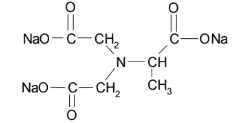Enhanced TDS
Identification & Functionality
- Chemical Name
- INCI Name
- Supplied By
- CASE Ingredients Functions
- Cleaning Ingredients Functions
- Cosmetic Ingredients Functions
- Industrial Additives Functions
- Molecular formula
- MGDA - Na₃
- CAS No.
- 164462-16-2
- EC No.
- 423-270-5
- Technologies
- Product Families
- Chemical Structure

Features & Benefits
Applications & Uses
- Markets
- Applications
- Segments
- Applications
- Applicable Processes
- Home Care Applications
- I&I Cleaning Applications
- Recommended Applications
Household cleaning
- Dissolvine® M-40 effectively replaces phosphorous containing builders in dishwashing detergents.
- It enhances the cleaning power of a cleaner / detergent by sequestering hard water ions from water and dirt.
- It prevents the deactivation of surfactants from hard water metal ions.
- It also deactivates transition metal ions thus stabilizing detergents that contain peroxides.
Industrial & Institutional cleaning
- Dissolvine® M-40 forms stable, water-soluble metal complexes with all potentially harmful metal ions.
- It dissolves existing and prevents new scales from causing problems in water circulation equipment (in e.g. the power, brewing, and sugar industries).
Because of its low molecular weight this chelate performs very well in short contact cleaning.
Properties
- Physical Form
- Appearance
- Clear, colorless to light yellow liquid
Regulatory & Compliance
- Certifications & Compliance
Packaging & Availability
Storage & Handling
- Storage Conditions
- Store in original packing or in PVC, PP, PE, stainless steel or bituminized tanks.
- Avoid contact with aluminum, zinc, nickel, copper and copper alloys.
- It is advised to re-test the material after three years of storage.
